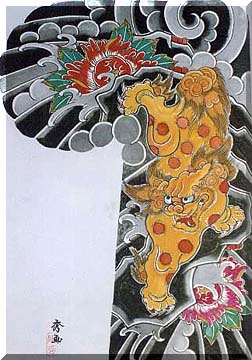Kara-jishi
The kara-jishi (唐獅子, lit. "China Lion") is a Japanese mythological animal. The kara-jishi is venerated in East Asia—especially in Buddhism—as the king of all animals. Pairs of stone kara-jishi are commonly displayed at the entrances to temples and shrines as guardians.
In horimono tattoos, the kara-jishi is almost exclusively depicted with the peony, or botan, which is correspondingly considered the king of all one hundred flowers; a tattoo of the two kings together represents the pinnacle of the terrestrial kingdom.
As many tattoo artists in the West incorporate Japanese designs into their work, the kara-jishi can be seen in many tattoos in America and Europe; curiously North Americans often refer to the kara-jishi as a "Foo Dog," although originally according to Chinese mythology, they represent lions.
